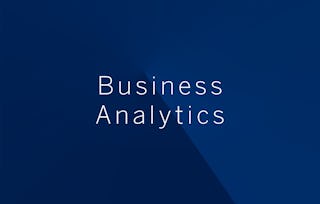‘Megatrends’ heavily influence today’s organisations, industries and societies, and your ability to generate insights in this area is crucial to your organisation’s success into the future. This course will introduce you to analytical tools and skills you can use to understand, analyse and evaluate the challenges and opportunities ‘megatrends’ will inevitably bring to your organisation. Via structured learning activities you will explore how these trends can be addressed through sustainability-oriented innovation. You will be introduced to key data analytics concepts such as systems thinking, multi-level perspectives and multidisciplinary methods for envisioning futures, and apply them to specific real-world challenges you and your organisation may face. And there’ll be a focus on future-proofing skills such as teamwork, collaboration with diverse stakeholders and accounting for judgements made within ethical decision-making frameworks.

Business intelligence and data analytics: Generate insights

Business intelligence and data analytics: Generate insights
This course is part of Analysing: Numeric and digital literacies Specialization

Instructor: Connor Stead
23,435 already enrolled
Included with
464 reviews
Skills you'll gain
Details to know

Add to your LinkedIn profile
12 assignments
See how employees at top companies are mastering in-demand skills

Build your subject-matter expertise
- Learn new concepts from industry experts
- Gain a foundational understanding of a subject or tool
- Develop job-relevant skills with hands-on projects
- Earn a shareable career certificate

There are 6 modules in this course
Organisations and governments everywhere want to exploit data to predict behaviors and extract valuable real-world insights. Billions of devices and social media conversations are fueling the rate at which humanity is producing data. Therefore, we need more skills to understand data and make our systems, policies and governance models more efficient. This week we will highlight the potential of generating insights with the help of data in allowing individuals, businesses, and governments to make effective decisions.
What's included
6 videos5 readings2 assignments1 app item
In week 2, we’ll focus on basic statistics. It’s one of the most important components of Data Analytics and it’s crucial to have a clear understanding of all the related concepts to be successful in the data industry. Statistics provide us with a set of tools that offer ways to convert quantitative data and qualitative data into information that we can use to generate insights.
What's included
5 videos2 readings2 assignments
Businesses must constantly strive to offer “better” products and services than their competitors. One of the oldest and time-proven techniques by which we can visualise and think about quality in a methodological way is via normal distributions or bell curves. So in week 3, we’ll start by learning about histograms and the normal curve and then have a look at empirical rule which gives us a quick rough estimate about the spread of the given data. Finally, we’ll learn about the measures that quantify the interrelationships between two data variables. Correlation and covariance are two important measures that quantify the relationship between variables and we’ll study both.
What's included
4 videos3 readings2 assignments
Visualisation is a key technique which can provide answers hidden in data. In this week, you will explore various data visualisations available and how to use them for analysis. These techniques will empower you to create compelling stories and dashboards from your data that the non-analyst community can also understand easily. As a person working in the data industry, you don’t just need to deal with data and solve data-driven problems but the incumbent also needs to convince company executives and government officials of the right decisions to make. These executives/officials may not be well versed in data science, so the incumbent must but be able to present and visualise the data’s story in a way they will understand. And this module will help you achieve that.
What's included
4 videos2 readings2 assignments
This week we learn how to create bar and bullet charts, and dashboards. Data visualization helps to tell stories by curating data into a form easier to understand. A good visualisation tells a story, by removing the noise from data and highlighting the useful information.
What's included
5 videos2 readings2 assignments
This week we’ll look at how, by using predictive modelling, we can generate actionable insights that when implemented will provide businesses with a predictable future outcome. Predictive modeling is a group of methods and algorithms that you can employ to forecast an outcome. Utilising basic predictive modelling techniques, we will also explore consumer demand forecasting.
What's included
4 videos2 readings2 assignments
Earn a career certificate
Add this credential to your LinkedIn profile, resume, or CV. Share it on social media and in your performance review.
Instructor

Offered by
Explore more from Business Essentials
 Status: Preview
Status: PreviewCampus BBVA
 Status: Free Trial
Status: Free Trial
Packt
 Status: Free Trial
Status: Free TrialFractal Analytics
Why people choose Coursera for their career

Felipe M.

Jennifer J.

Larry W.

Chaitanya A.
Learner reviews
- 5 stars
70.04%
- 4 stars
21.98%
- 3 stars
4.52%
- 2 stars
1.50%
- 1 star
1.93%
Showing 3 of 464
Reviewed on Apr 5, 2022
A wonderful journey i had with prof conor stead really a calm teacher with the right easy and understandable choose of words he made me do this thankyou very much to each and every contributer
Reviewed on Jan 31, 2021
The course is good to understand the basis to Tableau software and also mapping it with real business problems.
Reviewed on Jun 10, 2020
It was a great course very explanatory and with great practice tests.

Open new doors with Coursera Plus
Unlimited access to 10,000+ world-class courses, hands-on projects, and job-ready certificate programs - all included in your subscription
Advance your career with an online degree
Earn a degree from world-class universities - 100% online
Join over 3,400 global companies that choose Coursera for Business
Upskill your employees to excel in the digital economy
Frequently asked questions
To access the course materials, assignments and to earn a Certificate, you will need to purchase the Certificate experience when you enroll in a course. You can try a Free Trial instead, or apply for Financial Aid. The course may offer 'Full Course, No Certificate' instead. This option lets you see all course materials, submit required assessments, and get a final grade. This also means that you will not be able to purchase a Certificate experience.
When you enroll in the course, you get access to all of the courses in the Specialization, and you earn a certificate when you complete the work. Your electronic Certificate will be added to your Accomplishments page - from there, you can print your Certificate or add it to your LinkedIn profile.
Yes. In select learning programs, you can apply for financial aid or a scholarship if you can’t afford the enrollment fee. If fin aid or scholarship is available for your learning program selection, you’ll find a link to apply on the description page.
More questions
Financial aid available,

